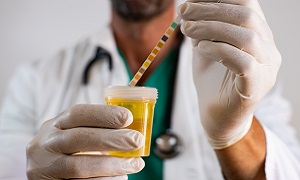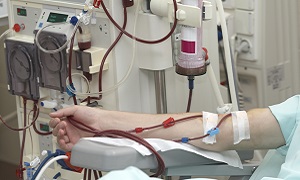Best Doctors in India for Acute Kidney Failure Treatment
Best Hospitals in India for Acute Kidney Failure Treatment
- City: Mumbai, India
Hospital Highlights:
- Fortis Hiranandani hospital was established in 2007.
- The hospital is an advanced tertiary care, multi-specialty hospital equipped with 149 beds.
- The hospital is equipped with a super ICU to provide emergency medical care to critically ill patients.
- The hospital is NABH accredited.
- The critical care facility in the hospital is augmented with the state-of-the-art facilities that facilitate speedier diagnosis and efficient monitoring.
- The hospital provides specialty medical services in cardiology, orthopedic science, pediatric science, neurology, diabetic care, urology, nephrology, ENT, obstetrics, gynecology, cosmetic surgery, bariatric surgery, neuro and spine care.
- City: Gurugram, India
Hospital Highlights:
- W Pratiksha Hospital, Gurugram, is one of the best hospitals in the NCR region. It is also a top hospital in India for IVF. Since its inception, the hospital has performed over 5500 successful IVFs. The hospital also specializes in gynecology.
- With over 20 years of experience in providing quality healthcare, the hospital is known as one of the most trusted and valued health providers in India.
- Equipped with world-class medical facilities and advanced technology, the hospital’s doctors and clinicians also have a track record of delivering excellent results. The hospital is also known for focusing on preventive well-being as much as on curative treatment.
- The hospital has earned the trust of its patients, by providing the best available treatments at affordable costs.
- City: Gurugram, India
Hospital Highlights:
- Paras hospital was established in 2006 and is the 250 bedded flagship hospital of Paras Healthcare.
- The is supported by a team of doctors of international and national repute.
- The hospital is NABH accredited and also the first hospital in the region to have a NABL accredited laboratory.
- The hospital provides specialty medical services in around 55 departments including Neurosciences, Joint Replacement, Mother & Child Care, Minimal Invasive Surgery, Gynecology and Obstetrics, Ophthalmology, Dermatology, Endocrinology, Rheumatology, Cosmetic and Plastic surgery.
- The hospital is equipped with state-of-the-art technologies.
- City: Kolkata, India
Hospital Highlights:
- Fortis Hospital, Anandapur, Kolkata is a world-class super-speciality equipped with the latest technologies in the medical world.
- The hospital is NABH accredited.
- This state-of-the-art facility specializes in cardiology and cardiac surgery, urology, nephrology, neurosciences, orthopaedics, digestive care, emergency care and critical care.
- The hospital, governed by integrated Building Management System (IBMS), has a pneumatic chute system, for quick vertical and horizontal transportation between floors, facilitating speedy transfer of patient specimens, documents, reports, and medicines to the concerned departments.
- The hospital also has a nephrology department with over 28 advanced dialysis units.
- City: Mumbai, India
Hospital Highlights:
- SL Raheja hospital is a 140-bed multi-specialty tertiary care hospital that is being managed by Fortis Healthcare Ltd.
- The hospital is a benchmark in healthcare and medical facilities in the neighborhood of Mahim & the western suburbs.
- L.Raheja Hospital, Mahim has one of the most effective ICU and Casualty care services.
- The hospital provides specialty medical services in Cardiology, Oncology, Neurology, Orthopedics, Mother & Child Care, and in Diabetes.
- City: Mumbai, India
Hospital Highlights:
- Wockhardt Hospitals were established in the year 1973, originally called First Hospitals and Heart Institute.
- Wockhardt Hospitals are super specialty health care networks in India, nurtured by Wockhardt Ltd, India’s 5th largest Pharmaceutical and Healthcare company.
- Wockhardt Hospitals is associated with Partners Harvard Medical International, an international arm of Harvard Medical School, USA.
- Wockhardt Heart Hospital performed India’s first endoscopic heart surgery.
- The hospital has a state-of-the-art infrastructure equipped with the latest technologies and modern equipment.
- It has special Centers of Excellence dedicated to the major specialties to provide hassle-free and high-quality clinical care.
- City: Gurugram, India
Hospital Highlights:
- The CK Birla Hospital in Gurugram is a NABH-accredited multi-specialty hospital.
- The hospital strives to increase the quality of healthcare by focusing on UK NHS nurse and midwife training requirements. Policies and practices derived from the National Institute for Health and Treatment Excellence (NICE) recommendations in the United Kingdom ensuring that a strong focus on safety, high-quality clinical care, and sanitation is maintained.
- The hospital’s cutting-edge technology and facilities allow for real-time communication and seamless collaboration among caregivers, ensuring accuracy and the best possible results. Those with foreign experience and accreditations make up part of the hospital’s team of clinicians.
- City: Ahmedabad
Hospital Highlights:
- As a member of the Apollo Hospitals Group, Apollo Hospitals International Limited, Ahmedabad is one of the most popular and sought-after medical facilities in Gujarat.
- Through its 6 Centres of Excellence and various affiliated branches, which cover all specialties and subspecialties, the hospital provides the most advanced clinical services.
- Since its inception in 2003, the hospital has been providing each patient with the most up-to-date medical equipment and state-of-the-art technology.
- With more than 150 successful organ transplants, including liver and renal transplants, the facility has been able to build a strong and extensive organ transplant program.
- In addition to performing 600 surgeries and caring for over 1800 patients on an IP basis, the hospital sees more than 18,000 patients on average in the outpatient department.
- With one of the biggest cardiology teams in the area, the hospital provides state-of-the-art regional care treatment in Cardiac Sciences.
- Additionally, the hospital offers a broad range of Neuro Interventional techniques to help stroke patients recover more quickly.
- City: Noida, India
Hospital Highlights:
- Jaypee Hospital is the flagship hospital of the Jaypee Group.
- This hospital has commissioned 525 beds in the first phase and has been planned and designed as a 1200 bedded multi-specialty facility.
- It holds the accreditation of the NABH and NABL.
- The hospital has state-of-the-art infrastructure equipped with the latest technologies and modern equipment like 64 Slice PET CT, Dual Head 6 Slice SPECT CT, Gamma Camera, and Da Vinci Robotic Surgery for comprehensive robotic surgical solutions.
- It has special Centers dedicated to the major specialties to provide hassle-free and high-quality clinical care.
- City: Mumbai, India
Hospital Highlights:
- Reliance Hospital is one of the best super-specialty care hospitals in Navi Mumbai.
- The main purpose of this hospital is to become a trustworthy place for the best health and hope for society. The hospital is well connected to the suburbs of Mumbai and Navi Mumbai.
- The hospital has various specialty departments, viz., Accident & Emergency, Anesthesiology, Dental Services, Dermatology, Diabetology, Dietetics Nutrition, Endocrinology, ENT, Gastroenterology, General Surgery, Gynaecology And Obstetrics, Hepato Pancreato Biliary Surgery, Infectious Disease, Internal Medicine, Interventional Radiology, Laboratory Medicine, Minimal Access Laparoscopic Surgery, Nephrology, Neurosciences, Opthalmology, Orthopaedics, Paediatrics, Pain Management Palliative Care, Physical Medicine Rehabilitation, Plastic And Reconstructive Surgery, Psychiatry, Pulmonary Medicine, Radiology, Rheumatology, Transplant, Urology Andrology, Vascular Surgery
ACUTE KIDNEY FAILURE
Acute kidney failure, which is also termed as acute renal failure, is a condition which occurs when your kidneys suddenly stop working. It can happen in just a few hours or days.
This condition is not always permanent, and your kidneys can return to normal function, if you receive immediate treatment right away, and if you are not having other serious health problems.
The main purpose of the kidneys is to filter out the waste from your blood. They also need to remove any extra fluid that is in your blood, which becomes your urine. Kidneys also help in making red blood cells as well as regulating electrolytes.
When kidneys are damaged, they are unable to work well. This could happen due to another health condition, such as diabetes. When there is a decrease in kidney function which happens over a longer period of time, it is known as chronic kidney failure.
Symptoms
You may not show any symptoms of acute kidney failure, and it might be discovered by your doctor during a lab test for another reason.
However, if you do show symptoms, then they are going to depend on how severe your condition is. Some of them might include:
- Urinating less than normal
- Itching
- Joint pain, swelling
- Swelling in your legs, ankles, and feet
- Feeling very tired or drowsy
- Throwing up or feeling like doing so
- Chest pain or pressure
- Confusion
- Shortness of breath
- Loss of appetite
- Muscle twitching
- Stomach and back pain
- Fever
- Seizures or coma (in severe cases)
- Rash
- Nosebleed
Causes
Acute kidney failure occurs when you have a condition which can slow the flow of blood to your kidneys, or if you experience any direct damage to the kidneys. In some cases, your kidney’s urine drainage tubes, i.e. ureters, can get blocked, due to which wastes might be unable to leave the body through your urine.
Certain conditions can slow blood flow to the kidneys, which can cause kidney injury. These include:
- Blood or fluid loss
- Heart disease
- Infection
- Liver failure
- Blood pressure medications
- Heart attack
- Use of medications such as aspirin or ibuprofen
- Severe allergic reaction
- Severe dehydration
- Severe burns
There are also diseases and conditions, which can damage the kidneys which can lead to acute kidney failure. They include:
- Blood clots in the veins and arteries in as well as around the kidneys
- Glomerulonephritis, which is an inflammation of the tiny filters of the kidneys
- Cholesterol deposits which can block blood flow in your kidneys
- Hemolytic uremic syndrome, a condition resulting from premature destruction of red blood cells
- Viral infection, such as with the virus that causes coronavirus disease 2019 or COVID-19
- Certain chemotherapy drugs, antibiotics, and dyes used during imaging tests
- Lupus, an immune system disorder that leads to glomerulonephritis
- Scleroderma, a group of rare diseases which can affect your skin and connective tissues
- Toxins, like alcohol, heavy metals or even cocaine
- Thrombotic thrombocytopenic purpura, which is a rare blood disorder
- Muscle tissue breakdown or rhabdomyolysis, that leads to kidney damage caused by toxins from the destruction
- Breakdown of tumor cells which can lead to the release of toxins, which can cause an injury in the kidney
Several diseases or conditions that can block the urine from passing out of the body may also cause acute kidney injury. They include:
- Bladder cancer
- Colon cancer
- Enlarged prostate
- Blood clots in the urinary tract
- Cervical cancer
- Kidney stones
- Nerve damage involving the nerves controlling the bladder
- Prostate cancer
Diagnosis
If your signs and symptoms are suggesting that you might have acute kidney failure, then your doctor might recommend certain tests and procedures in order to verify the diagnosis. These can include the following:
Urine output measurements
Blood tests
Urine tests
Imaging tests
Removing a sample of kidney tissue for testing

Treatment
Your treatment is going to depend on what your cause of acute kidney failure is. The goal of the treatment is to always restore the normal function of the kidneys. It is also important to prevent fluids and wastes from building up, during the recovery of the kidneys. In most cases, the evaluation is made by a kidney specialist known as a nephrologist.
Diet
Medications
Dialysis
Complications
Certain complications which can arise from acute kidney failure include:
- Chest Pain- If the lining covering your heart, i.e. pericardium becomes inflamed, you might experience chest pain.
- Fluid Buildup- Acute kidney failure might lead to a buildup of fluid in the lungs, which can cause shortness of breath.
- Muscle Weakness- Muscle weakness can be caused by your body’s fluid and electrolytes, and your body’s blood chemistry when they are all out of balance.
- Permanent Kidney Damage- Generally, acute kidney failure can lead to permanent loss of kidney function or even end-stage renal disease.
- Death- Acute kidney failure might also lead to loss of the function of your kidneys, and even death.
Prevention
Though it is generally hard to predict or prevent, taking a few steps can reduce your risk of developing acute kidney failure.
If you have kidney disease or any other condition, which can increase the risk of acute kidney failures, such as diabetes or high blood pressure, then follow your doctor’s recommendations to manage your condition.
Make a healthy lifestyle a priority. Make sure that you are active, and eat a sensible and balanced diet. If you drink alcohol, do it in moderation.

















